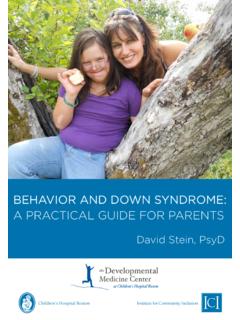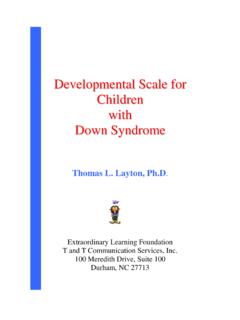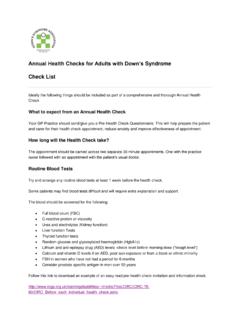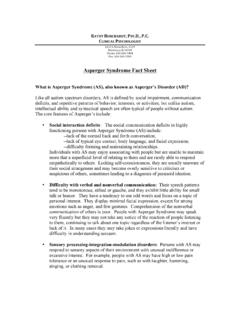Transcription of Dealing Death - New Zealand Down Syndrome Association
1 32 NZDSA Autumn 2004 DealingwithDeath Bereavement literally means to bedeprived by Death . When experiencedafter the Death of someone loved,bereavement is perhaps one of life smost stressful events. In the past people with Downsyndrome would often die beforetheir expectancy for people withDown Syndrome has increaseddramatically, so now many adultswith down Syndrome experiencethe Death of their parents, who inmany cases have been their the past, people with down Syndrome were denied the right to grieve because othersmistakenly assumed that they had no capacity to do so. It was thought that people with Downsyndrome did not experience grief, or recognise or comprehend following three real-life stories clearly show grief felt by children with DS and this adaptationof an article from the DSA of the UK (Stuart Mills, April 2002) gives more information.
2 When people with learningdifficulties are bereaved, theirreactions to the loss are frequentlymisunderstood. Grieving is a highly individualprocess and people respond tobereavement and express their griefin different ways. The person with learning disabilitiesexperiences the same processes asthe rest of the population. The grieving process for those withlearning disabilities may howevertake longer. Grief may manifest itself in ways thatare not instantly recognisable. Usually people with down syndromecan work through their feelings aboutan unhappy event and come to termswith it, but will probably need helpto do this. Bereaved people with learningdisabilities may find that other peoplemake decisions that affect their liveswithout any warning, or any elementof personal choice or of Autumn 2004 33 Whether or not they have learningdisabilities, people react individuallyto grief.
3 Most people experience at least someof the common responses tobereavement. These are summarisedbelow: An initial sense of shock, numbness,disbelief and denial accompanied byone or more physical symptoms suchas lack of energy, trouble inconcentrating, remembering, makingdecisions, hyperactivity, thinkingabout wanting to die and a sense ofunreality. As the early shock wears off and theimpact of the reality of the Death isfelt, people may experience thefollowing reactions: Emotional: Anger with thedeceased or with those who it isbelieved could have prevented theloss. Guilt, anxiety, fear, panic,depression, despair, mood swings,irritability, crying, sadness, yearningand pining, sense of being abandoned. Physical: Symptoms such as pain,appetite disturbance, breathlessnessand illness.
4 People with learningdisabilities, who are less able toexpress themselves verbally, mayexperience and exhibit increasedphysical symptoms of grief. Behavioural: Low vitality, needfor more sleep, sleeplessness,hyperactivity, withdrawal and a lackof interest in normal activities. Mental: Confusion, hallucinations,nightmares, insecurity, searching forthe deceased, poor concentration,regression and loss of Resolution occurs when the bereavedis able to think of the deceased withoutpain or anger and can recall the timesthey had together in a positive way. The journey towards resolution is notalways a continuous or direct one. Itmay take a considerable time. Not everyone will experience all ofthe symptoms detailed grief can continue intodepression and this may well show itself,in someone with a learning disability, inunexpected , not everyone will get one loss can then lead on toother major changes that may result example, after parents have died,people with a learning disability are oftenmoved to emergency residential care.
5 Thismeans that they lose their home, theirfamiliar possessions and routines, as wellas their parent and a more serious and persistentdepression is a particular risk for people withlearning disability because carers oftenmiss the early signs of time to get help is when any changesin behaviour or mental state persist for alengthy period of should then seek professional help forfurther information. Always give the news of a Death withhonesty and at a pace suited to theindividual. The news of a Death shouldnot be kept from an individual in anattempt to protect him or her. Always use straightforward languagein order to avoid misinterpretation bythe person with learning use of terms such as Death and died are preferable to terms such as passed on or gone to sleep . The person with learning disabilitiesshould be given the choice as towhether or not they wish to take partin the rituals associated with Death .
6 If the person is unable to choosedirectly, it is advisable to involve theperson as fully as possible. Non-verbal rituals may be particularlyhelpful to people with learningdisabilities. It is important to allow the bereavedperson to have the opportunity tochoose a memento by which toremember the deceased person and toact as a focus for their feelings. Avoid major change at this confusingand distressing time. Many peoplewith learning disabilities find changeof any kind difficult to cope with. Routine can be particularly important,providing an important sense of orderand structure. The person withlearning disabilities may find itcomforting to take refuge in their dailyroutines and familiar surroundings. Helping the bereaved person tomaintain some continuity andconnection with life before thebereavement is essential to recovery.
7 Always give the individual withlearning disabilities space and time inwhich to express their feelings. If the deceased is a family member, itmay be helpful to create opportunitiesfor the person with learningdifficulties to communicate his or herfeelings to someone outside of thefamily. You may wish to consider specialistbereavement counselling for theperson with learning responsesHow to helppain, appetite disturbance, breathlessness and illness may occur34 NZDSA Autumn 2004It seems these days everybody knowsabout Nelson. Two years ago, when wedecided Auckland was no longer where wewanted to live, Nelson was still relatively undiscovered . After a long successfulbanking career my husband chose earlyretirement, and we decided to return to hishometown of Nelson.
8 We found ourdream home, complete with its own smallolive grove, in the foothills of Ruby was to be our little piece of much it was a diamond in therough, we saw the potential and planned,plotted, dreamed and schemed of how tomake our dream a , we were fully awarerelocating our family was going to involvesacrifices. We were all leaving behindclose friends, and living at Ruby Baymeant adapting to a completely differentlife style. We discussed this as a familyand included the children in our was going to get a flying fox anda swing - two of her passions - and a and her Dad had even drawn up ashortlist of names for their brown dog .We were all excited and looking forwardto a new stage in our lives. The onlychallenge we faced in the immediate futurewas farewelling Chris who was leavinghome to commence tertiary studies - andthe multi-syllabic word university entered Kendall s , it was only one month after ourarrival in Nelson, and just four days afterChris s departure, that our lives took asudden, tragic and totally unexpected Kendall s perspective she went tobed one night and her life was everythingit had ever been; she woke up to an entirelydifferent world, a world that no longer heldher father.
9 He had died suddenly duringthe night. Surprisingly, Kendall, anormally light sleeper, had slept throughthe noisy arrival of ambulance officers,police, doctors, neighbours and familymembers. In those first hours one of myforemost concerns was, how do I tellKendall? How do I put the unspeakableinto words? I can t now recall the exactwords I used when she woke, and I don tthink Kendall could fully grasp themeaning of my message anyhow, but shedid understand something of our grief andour tears and she did realise her Dad wasnot to be that morning the funeral directorreturned to our home. I asked him for helpand his words and guidance formed thecornerstone for what was to follow. I willalways be grateful to Stephen Day for thecompassion he displayed, the wisdom heshared and the care and respect he showedmy suggested that I break everything downinto very simple steps and explain in wordsthat Kendall would understand exactlywhat we were doing and why.
10 In retrospectit sounds so sensible but at the time shockseemed to rid me of coherent thought. AllI could think was that the old euphemism Daddy s gone to sleep was not at allappropriate and was simply an evasion ofthe painful , we told Kendall that the part of Dadthat walked and talked and played gamesand gave Kendall prickly kisses and hugsand laughed and sang and read stories, thatpart had gone to heaven. We then went onto tell her that when people go to heavenwe don t get to see them any more, theycan t come home on holiday and they can tphone home, but we still love them andthey know we still love them. And theystill love us just as much as ever. We toldher that heaven was a good place to were careful to differentiate betweenChris leaving home and going to universityand her father dying.






